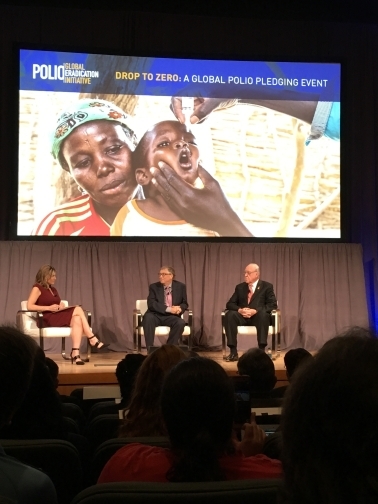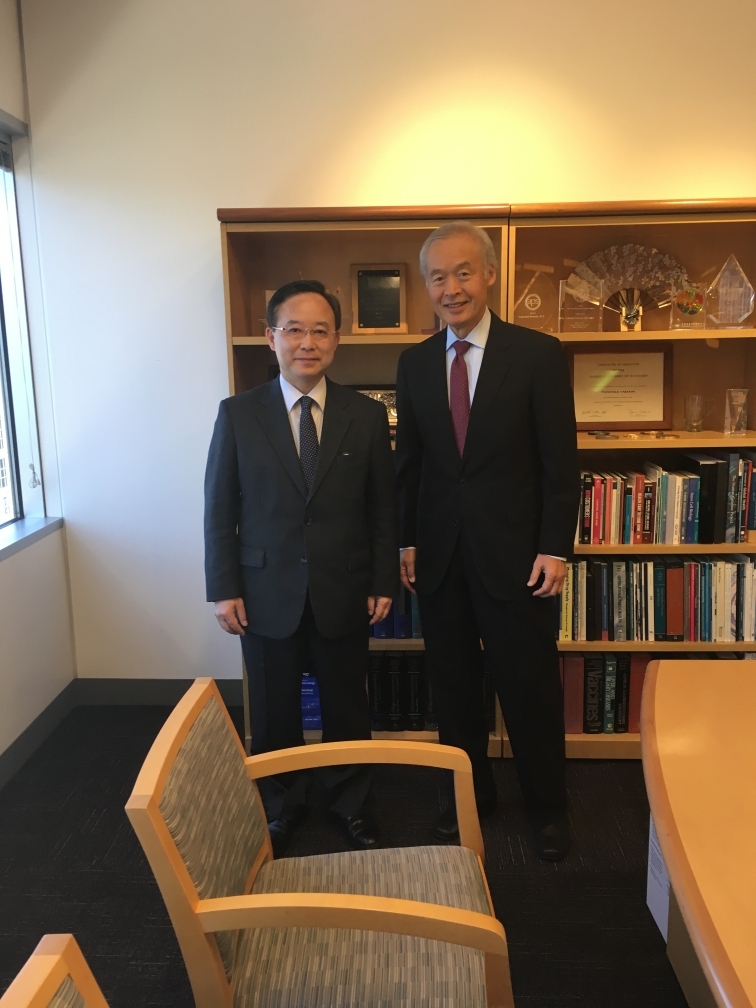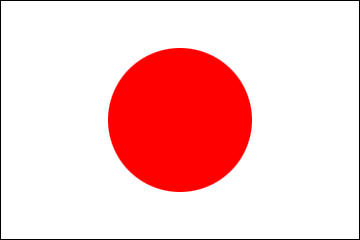Through the Eyes of the former Consul General Yamada (June, 2017 - July, 2020)
2017/7/24

Rotary International Convention in Atlanta
I attended the Rotary International Convention that was held in Atlanta from June 10 through June 12. The event gathered approximately 40,000 representatives from 200 countries and regions, including Japan. In addition to the opening ceremony and featured sessions, there were break-out meetings on various themes as well as the convention’s main highlight: a giant hall holding hundreds of booths that featured the work of rotary organizations worldwide. With the kind assistance from Seattle Rotary’s President Catherine Gibson, I was able to have a wonderful time, attending along with a large group of Rotarians from Seattle. Established in 1909, the Seattle Rotary Club is the fourth oldest club in the country, and is said to be the club with the most members and active programs. During her presidency, which ended in June, President Gibson prioritized various social issues, including actively promoting a welcome environment for the transgender community and addressing overall discrimination in society.
Since 1979, Rotary International has taken up an initiative to eradicate polio, vaccinating over 25 billion people in 122 countries. At the Atlanta International Convention, Mr. Bill Gates, co-chair of the Bill & Melinda Gates Foundation and the biggest contributor in the fight against polio, attended and enthusiastically spoke about efforts and challenges in trying to eradicate polio in the world. Polio is well known in the U.S. because of the infection and resulting paralysis of President Franklin Roosevelt. The Japanese government considers the eradication of polio an important issue and has invested over 5 billion dollars for international cooperative efforts. In Atlanta, a video message from Prime Minister Shinzo Abe was shared at the polio eradication session. We are one step closer to reaching our goal of complete eradication, Nigeria, Pakistan and Afghanistan being the only countries where polio is reported. However, despite persistent efforts, these three countries have remained in this status for the last 10 years. In Japan, there is a proverb, “He who goes a hundred miles, should consider himself halfway at the ninety-ninth.” Hopefully, the remaining hill will somehow be overcome through consistent international efforts, and polio will someday go the way as that did smallpox, becoming the second infectious disease to be eradicated from human beings. Then, we can speak about polio as being an issue of the past.

Visiting Dr. Tachi Yamada - The man behind the Hideyo Noguchi Africa Prize
On returning from Atlanta, I was able to meet someone closely connected to the work of Mr. Bill Gates. On June 23, I visited Dr. Tachi Yamada. Dr. Yamada is a physician (though is now actively in leadership roles and no longer practicing) who worked as the president of the Bill & Melinda Gates Foundation Global Health Program from 2006 to 2011, proposing, implementing and facilitating various ideas related to the Foundation’s efforts to improve sanitation in the developing world, serving as an inspiration for many people working in global health. During my work for the World AIDS Tuberculosis Malaria Fund and WHO in the Ministry of Foreign Affairs as well as my time in Kenya, I felt the magnitude of the presence of the Gates Foundation. I often heard the name of Tachi Yamada, so when I came to Seattle, he was someone I most keenly wanted to meet. Even after retiring from the Bill & Melinda Gates Foundation in 2011, his activity has not declined, and while working on drug development at Takeda Pharmaceuticals, he continues to be one of the central figures leading U.S. global health efforts today.Dr. Yamada has a deep connection with Japan while having a career based in the U.S. At the 2008 Tokyo International Conference of African Development (TICAD IV), the first award ceremony was held for the Hideyo Noguchi Africa Prize, honoring those who have made remarkable contributions towards improving Africa's health and sanitation. Dr. Tachi Yamada was a great contributor towards both the creation of the prize and the selection of winners. In addition, following the framework established by the Japanese government in 2013, he played a central role in involving the public and private pharmaceutical sectors to launch the GHIT Fund (Global Health Innovative Technology Fund) that works on the development of new drugs for neglected tropical diseases. Dr. Yamada explained the idea behind these initiatives and introduced me to Dr. Chris Elias, the current president of the International Health Program at the Gates Foundation.
Encouraging the cooperation between Japan and the people of Washington State in the field of global health is one of my main priorities during my tenure in Seattle.
